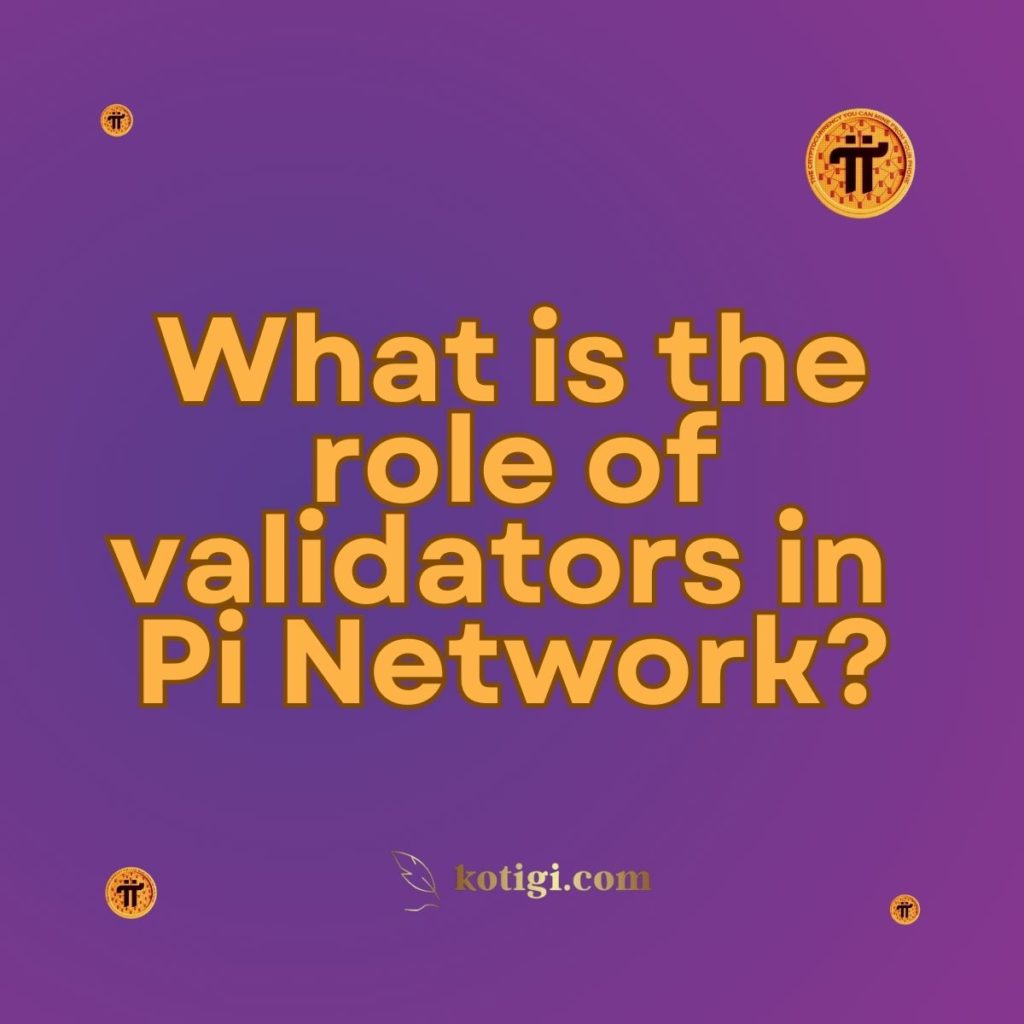
What is the role of validators in Pi Network?
Validators in the Pi Network play a crucial role in ensuring network security, verifying transactions, and maintaining consensus among users. They contribute to the overall integrity of the blockchain by participating in the validation process, thus facilitating a trustworthy and decentralized ecosystem.
Introduction
In the rapidly evolving world of cryptocurrency, the architecture and governance of blockchain networks are vital for their success and sustainability. Among these networks, the Pi Network stands out for its unique approach to mobile mining and community involvement. One of the key components of this network is the role of validators, individuals responsible for maintaining the network’s integrity and security.
Validators are essential in any blockchain ecosystem, as they verify transactions, maintain consensus, and ensure the overall reliability of the system. In the case of the Pi Network, the role of validators takes on additional significance due to its commitment to a decentralized and community-driven platform. This blog post will explore the vital role of validators in the Pi Network, their responsibilities, selection process, and the impact they have on the overall ecosystem.
Understanding the role of validators is crucial for anyone interested in the Pi Network, whether they are potential users, developers, or simply curious about how decentralized networks function. By delving into the intricacies of this role, we can gain insight into the mechanisms that underpin the Pi Network and its commitment to creating a user-friendly, secure, and sustainable cryptocurrency.
1. Understanding Validators in Blockchain
Definition of Validators
In blockchain technology, validators are individuals or nodes responsible for verifying transactions and maintaining the integrity of the network. They play a crucial role in the consensus process, ensuring that transactions are legitimate and preventing fraudulent activities. Validators help maintain a decentralized network by validating blocks of transactions and securing the blockchain against malicious attacks.
In proof-of-stake (PoS) and similar consensus mechanisms, validators are selected based on their stake in the network, which can include the amount of cryptocurrency they hold or other criteria set by the network’s protocol. The selection process aims to ensure that validators have a vested interest in the network’s success, promoting responsible behavior and decision-making.
Importance of Validators
Validators are essential for the functioning of any blockchain network. They contribute to the following critical aspects:
- Transaction Verification: Validators review transactions to ensure they meet the network’s consensus rules, preventing double-spending and fraudulent activities.
- Maintaining Consensus: By validating blocks of transactions, validators help maintain consensus among network participants. This consensus is vital for ensuring that all nodes in the network agree on the state of the blockchain.
- Security: Validators play a crucial role in securing the network against attacks. Their actions ensure that only legitimate transactions are recorded on the blockchain, protecting the integrity of the system.
- Decentralization: A diverse group of validators helps maintain decentralization, reducing the risk of a single point of failure and enhancing the network’s resilience.
Different Types of Validators
There are several types of validators, depending on the consensus mechanism employed by the blockchain network. In general, these can be categorized into:
- Proof of Stake Validators: Selected based on their stake in the network, they validate transactions and create new blocks.
- Delegated Proof of Stake Validators: Users can delegate their staking power to validators, allowing them to participate in the consensus process without running their nodes.
- Proof of Authority Validators: A limited number of trusted nodes are selected to validate transactions, often used in private or consortium blockchains.
Understanding these categories is essential for grasping the specific role of validators within the Pi Network.
2. Validators in Pi Network
Overview of Pi Network’s Consensus Mechanism
The Pi Network operates on a unique consensus mechanism designed to facilitate mobile mining and community participation. Unlike traditional proof-of-work (PoW) systems that rely on intensive computational power, Pi Network employs a variation of the proof-of-stake (PoS) model, where validators are responsible for confirming transactions and maintaining network security.
This consensus mechanism is tailored for mobile devices, allowing users to mine Pi coins using their smartphones without the need for extensive resources. The design prioritizes user engagement and accessibility, making it easier for individuals to participate in the network.
Role of Validators in Pi Network
In the Pi Network, validators serve several key functions, including:
- Transaction Verification: Validators review and confirm transactions within the network. They ensure that all transactions adhere to the network’s consensus rules, preventing fraudulent activities and maintaining the integrity of the blockchain.
- Block Creation: Validators are responsible for creating new blocks in the blockchain. By validating a set of transactions, they can propose a new block to be added to the chain, facilitating the continuous growth of the network.
- Consensus Maintenance: Validators help maintain consensus among network participants. Their ability to confirm transactions ensures that all nodes in the network agree on the state of the blockchain, enhancing reliability.
- Community Engagement: Validators are often active members of the Pi Network community, engaging with users and providing support. Their involvement fosters a sense of community and encourages more individuals to participate in the network.
Selection Process for Validators
The selection of validators in the Pi Network is crucial for maintaining a secure and reliable ecosystem. The process involves several key criteria:
- Reputation: Validators are typically selected based on their reputation within the community. A positive track record of engagement and responsible behavior contributes to their selection.
- Staking Requirements: While Pi Network operates primarily on mobile devices, there may be staking requirements for individuals aspiring to become validators. These requirements ensure that validators have a vested interest in the network’s success.
- Community Voting: In some instances, the community may have the opportunity to vote on validator selections, further promoting decentralization and user participation in governance.
By implementing a thoughtful selection process, Pi Network aims to create a diverse and trustworthy group of validators that can effectively contribute to the network’s success.
3. Responsibilities of Validators
Verifying Transactions
One of the primary responsibilities of validators in the Pi Network is to verify transactions. Validators review the transactions submitted by users, ensuring that they comply with the network’s rules and preventing fraudulent activities. This verification process is essential for maintaining the integrity of the blockchain, as it ensures that only legitimate transactions are recorded.
Creating and Proposing New Blocks
Validators are responsible for creating and proposing new blocks to be added to the blockchain. Once a set of transactions is verified, validators can group them into a block and propose it to the network. This process is vital for the continuous growth of the blockchain and ensures that users’ transactions are recorded in a timely manner.
Participating in Governance
In addition to their technical responsibilities, validators play a role in the governance of the Pi Network. Validators may have the opportunity to participate in decision-making processes, influencing the future direction of the network. This involvement empowers validators and encourages them to act in the best interests of the community.
Supporting the Community
Validators are often active members of the Pi Network community, engaging with users and providing support. Their presence fosters a sense of community and encourages users to participate in the network. By answering questions, sharing knowledge, and providing guidance, validators contribute to a positive user experience.
Ensuring Security
Validators are crucial in ensuring the security of the Pi Network. Their verification of transactions and participation in the consensus process helps protect the network against attacks and fraudulent activities. By maintaining a secure environment, validators enhance user trust and confidence in the platform.
4. Challenges Faced by Validators
Network Scalability
As the Pi Network continues to grow and attract new users, scalability becomes a significant challenge for validators. The network must be capable of handling an increasing number of transactions while maintaining performance and reliability. Validators must adapt to this growth, ensuring that the network can scale effectively without compromising security or efficiency.
Maintaining Decentralization
While the role of validators is essential for the network’s success, maintaining decentralization is a challenge. A concentration of validators can lead to centralization, undermining the core principles of blockchain technology. The Pi Network must encourage a diverse group of validators to ensure that no single entity dominates the network.
Addressing Security Threats
Validators must remain vigilant against security threats, including potential attacks on the network. As cryptocurrency networks grow, they may become targets for malicious actors seeking to exploit vulnerabilities. Validators play a critical role in protecting the network by identifying and mitigating these risks.
Keeping Up with Technological Changes
The cryptocurrency landscape is constantly evolving, with new technologies and consensus mechanisms emerging regularly. Validators must stay informed about these changes and adapt their practices accordingly. Continuous education and training are essential for validators to ensure they can effectively contribute to the network.
User Engagement and Communication
Maintaining strong communication with the community is vital for validators. They must actively engage with users, address concerns, and provide guidance. Building trust and rapport within the community is crucial for validators to fulfill their responsibilities effectively.
5. The Impact of Validators on the Pi Network Ecosystem
Enhancing Trust and Reliability
Validators play a crucial role in enhancing trust and reliability within the Pi Network ecosystem. Their verification of transactions and participation in the consensus process instills confidence in users, ensuring that their transactions are secure and legitimate. This trust is essential for the long-term success of the network.
Promoting User Engagement
By actively participating in the community, validators encourage user engagement and participation. Their presence fosters a sense of belonging, motivating users to become more involved in the network. As users engage with the community, they are more likely to share their experiences and invite others to join, contributing to the network’s growth.
Facilitating Decentralization
A diverse group of validators helps maintain decentralization within the Pi Network. By ensuring that no single entity dominates the validation process, the network can remain resilient and secure. Validators play a vital role in promoting a healthy and decentralized ecosystem.
Supporting Ecosystem Growth
Validators contribute to the overall growth of the Pi Network ecosystem. Their active involvement in governance, community engagement, and transaction verification fosters a vibrant environment where users and developers can thrive. By supporting ecosystem initiatives, validators help create a sustainable and innovative platform.
Shaping the Future of Pi Network
As the Pi Network continues to evolve, validators will play an essential role in shaping its future. Their feedback and contributions to governance can influence decisions about new features, technological advancements, and community initiatives. By engaging with validators, the Pi Network can adapt to the changing landscape and meet the needs of its users.
6. Looking Ahead: The Future of Validators in Pi Network
Expanding Validator Participation
As the Pi Network grows, there will be opportunities for more users to become validators. By expanding participation, the network can maintain decentralization and enhance security. The Pi Network team may introduce initiatives to encourage more individuals to take on the role of validators, fostering a diverse and engaged community.
Enhancing Validator Tools and Resources
To support validators in their roles, the Pi Network may invest in developing tools and resources that facilitate their activities. This could include providing educational materials, analytics platforms, and communication tools to help validators engage with users effectively.
Strengthening Community Governance
The future of validators in the Pi Network will likely involve a stronger emphasis on community governance. By empowering validators to participate in decision-making processes, the network can foster a sense of ownership among its members. This collaborative approach will contribute to the overall health of the ecosystem.
Fostering Innovation
As the Pi Network evolves, validators can play a key role in fostering innovation within the ecosystem. By collaborating with developers and users, validators can help identify opportunities for new features, applications, and use cases for Pi tokens. This collaborative approach will contribute to the long-term success of the network.
Emphasizing Security and Education
Given the challenges faced by validators, the Pi Network will need to prioritize security and education. Providing resources and training for validators can help them stay informed about potential threats and best practices for maintaining network integrity. A proactive approach to education will strengthen the overall security of the Pi Network.
Conclusion:
The role of validators in the Pi Network is vital for maintaining the integrity, security, and decentralization of the ecosystem. By verifying transactions, creating new blocks, and engaging with the community, validators contribute to a trustworthy and user-friendly platform. Their responsibilities extend beyond technical tasks, as they also play a crucial role in shaping the future of the network through governance and community involvement.
As the Pi Network continues to evolve, the importance of validators will only grow. Their ability to adapt to challenges, promote user engagement, and foster innovation will be instrumental in the network’s long-term success. By understanding the critical role that validators play, users can appreciate the mechanisms that underpin the Pi Network and look forward to its exciting future.
Key Takeaways:
- Validators in the Pi Network are responsible for verifying transactions, maintaining consensus, and creating new blocks in the blockchain.
- The consensus mechanism employed by the Pi Network is designed for mobile mining, prioritizing accessibility and community engagement.
- Validators face challenges such as network scalability, maintaining decentralization, and addressing security threats.
- The impact of validators on the Pi Network ecosystem includes enhancing trust, promoting user engagement, and supporting ecosystem growth.
- The future of validators in the Pi Network will involve expanding participation, enhancing tools and resources, and fostering innovation.





